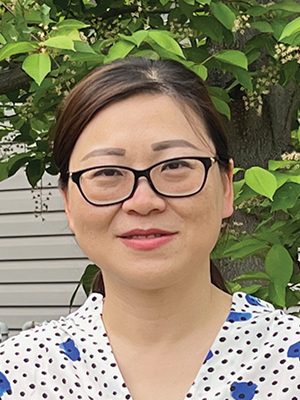Member Spotlight: Meet Lingyun Chen
Member Spotlight is a regular INFORM magazine column that features members who play critical roles in AOCS.
Lingyun Chen is a Full Professor at the University of Alberta and Canada Research Chair. Her research focuses on plant protein structure-function relationships and applying these to develop protein ingredients of improved functionalities, texture, and nutritional properties towards food applications. Chen has more than 200 publications and many invited presentations at national and international meetings.
She has been an active AOCS and Protein and Co-Products (PCP) Division member since 2016 and has held the positions of PCP Secretary-Treasurer, Newsletter Editor, and Vice Chair and she has organized many scientific sessions in AOCS Annual Meetings. Chen is also currently serving as the Associate Editor of Sustainable Food Proteins, a journal of the American Oil Chemists’ Society (AOCS), and Editor of a special issue of the Journal of the American Oil Chemists Society (JAOCS) with the theme: “Advancement in Plant Protein-Based Emulsions.”
How would you characterize the industry/interest area’s growth trajectory? Why are protein and co-products so important right now?
The interest in alternative proteins from both industry and academia have been growing rapidly over the past decade. These alternative proteins include plants, fungus, algae, insects and even cultured (lab-grown) meat. Plant-based protein sources, such as grains, legumes, oilseeds and nuts, are becoming increasingly popular as they are more sustainable and environmentally friendly. Plant-based proteins are also often low in saturated fat and high in dietary fiber, making them a healthier option for consumers. This trend will continue in the coming years.
For the oil processing industry, the protein is one of the major components in the co-product streams. Canola meal, for example, contains ~40% protein. The protein isolation from the side streams adds to profitability in this industry and reduces waste, meanwhile helping the industry to capture the rapidly increasing plant protein market opportunity.
The PCP Division provides a forum to bring industry, academia and government together. The division promotes discussion of the sciences and technologies associated with conventional and emerging green processing technologies for fractionation and extraction of proteins from bioresources and co-product streams (e.g., oilseed meals) for food, feed, biomaterial and other industrial applications, as well as protein characterizations and modifications for improved functional properties, sensory and nutritive quality.
What are the opportunities and challenges for Proteins and Co-Products?
Plant-based meat, dairy and eggs products offer great opportunities for plant-based protein development and drive economic growth while improving human health and mitigating climate changes. But further innovations are required to enable plant-based proteins to compete with traditional protein sources (meat, dairy and egg) on cost, accessibility, texture, flavor and nutritive value.
For example, sensory factors are among the most important in acceptability of plant-based proteins for western consumers because taste and texture of plant protein-based foods are different from the sensory characteristics of meat and dairy products in the traditional western diet. Many products in the alternative protein space still struggle with off taste. Advancements in flavor and texture and making plant protein-based foods more appealing to consumers is a big opportunity to boost market growth.
Scaling is one of the major challenges for cell-based meat and dairy protein produced from precision fermentation. There are many process parameters that are still yet to be optimized for scaling of these protein sources such as oxygen transfer rate, heating/cooling and mixing.
What scientific areas do you foresee as emerging critical topics?
Cellular agriculture such as cell-based meat and dairy protein by precision fermentation is an important emerging topic. Green processing of plant protein fractionation and extraction from co-product streams, and clean labeled plant protein-based food products with improved sensory and nutritive quality are topic areas currently addressed in the PCP scientific sessions but will continue to be critical topics in the coming years.
What other disciplines/industries are critical to the success of PCP-related advancements?
The challenges facing alternative protein industries will need to be addressed by combining expertise from different disciplines. For example, PCP is planning a scientific session on alternative protein creation by precision fermentation for the 2024 AOCS annual meeting in collaboration with the Biotechnology Division. The issues associated with texture and flavor of plant protein ingredients and food products will need to be addressed together with other AOCS Divisions such as Processing Division and Edible Applications Technology.
Outside of the annual meeting, what kind of content or learning opportunities are being considered for 2023-2024?
The leadership team is discussing webinars to introduce cutting-edge technology innovations to PCP members. We are also looking at micro-credential courses. For example, we have an on-going discussion with the Analytical Division to develop a course on protein structure and functionality characterizations to benefit industry scientists and young members, like graduate students. The division would also like to host mentoring workshops to help young members in their career development.
What are some of the benefits of being part of the PCP division?
Networking with peers is an important benefit of being part of this division. Being a part of this interest area also allows you to keep up to date with current trends, emerging topics, cutting-edge technologies and industry challenges in protein and co-product areas (through PCP newsletters and webinars). Students and young professionals also benefit from mentoring and industry exposure for job opportunities.


